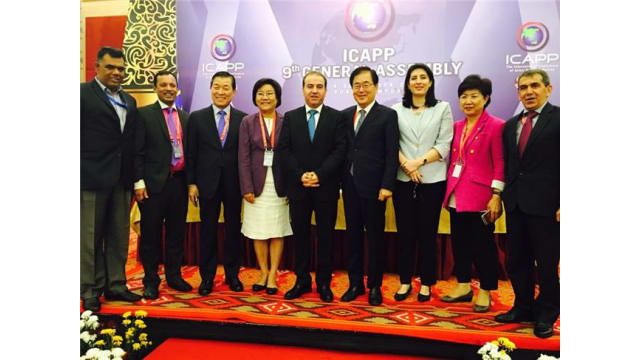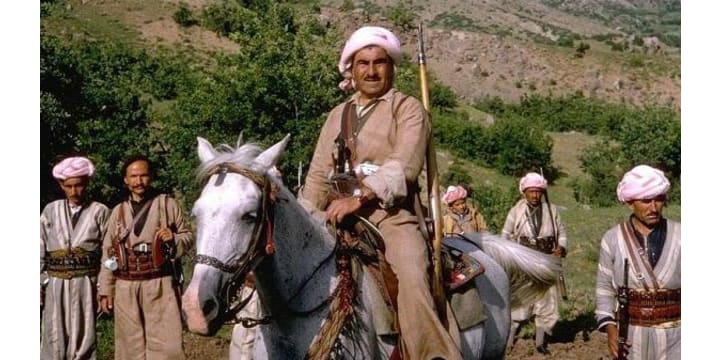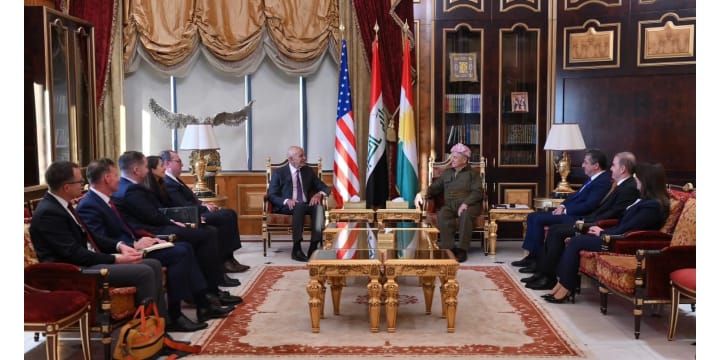
Hawrami in Kuala Lumpur conference intends to gather support for Kurdish referendum
On the sidelines of the ICAAP conference in Kuala Lumpur, Hemin Hawrami has met several prominent delegates from participating countries to discuss bilateral relations with the Kurdistan Region and to promote ties with political parties from south-east Asia.
Mr Hawrami, the Head of Kurdistan Democratic Party's Foreign Relations Office, is attending the three-day held in the Malaysian capital by official invitation from the ICAAP where participants are conversing the issues of latest developments in their respective regions.
He met with Vejay Joly, a representative of the BJP Party and Lee Sang Don, from South Korean People's Party for talks on the latest developments in Kurdistan and relations with the KDP where Mr Hawrami briefed on the impending referendum for an independent Kurdistan and the KDP's position, that a separate Kurdish statehood serves in the best interest of the people of Kurdistan.
At the outset of the conference, Mr Hawrami delivered a speech where he addressed delegates on the current issues facing Kurdistan and he expressed calls rallying for support as the region is preparing for a potential vote on independence.
Mr Hawrami later gave an interview with Malaysian television channel 'UMNO TV' where he spoke about the progress of Peshmerga forces in the military situation as they battle against Islamic State extremists, the impending liberation process of Mosul and general developments in the Kurdistan Region.
ICAPP 9th General Assembly
Maylaysia- Kuala lumpur
1 - 4 September, 2016
Speech of Mr. Hemin Hawrami, Head of Foreign Relations Office
Foreign Relations Office, Kurdistan Democratic Party (KDP)
Erbil, Kurdistan region, Iraq
Introduction:
Mr. Chairman, Excellences, diplomats of Asia countries and around the world, distinguished Guests, Monitors of COPPPAL, Media people, Ladies and gentlemen.
His Excellency, President Massoud Barzani sends his best regards and greetings to all members and participants of ICAPP 9th General Assembly.
Thank you for the invitation to attend ICAPP 9th General Assembly and the opportunity to discuss this theme of “ONE ASIA.” As may many of you already know that today we have several international challenges. First, the threat of ISIS to international peace and stability. Second, a humanitarian crisis, involving refugees and IDPs from the disorder in the region.
Today I am honored to come before you to enhance your knowledge about some of the challenges facing the Kurdistan region as well as the greater Middle East.
Part 1: Background of the crisis and achievements
Ladies and gentlemen, the situation in the Kurdistan region, in Iraq and in Syria is critical and of high priority. Currently, the Kurdish Forces, known as the Peshmerga, are battling the deadliest known terrorist organization on behalf of the free world. They are on the battlefield, fighting ISIS as we speak, with support from the anti-ISIS Coalition Forces. At this point, I would like to provide you with an update on the achievements in this war against
Terror.
Kurdistan Region Government and its Peshmerga forces are maintaining a battlefield of 1,000 kilometers with ISIS, And with the help of the anti-ISIS Coalition Forces have achieved great victory, wide areas have been liberated. In addition, with our limited supplies. According to credible sources, more than 24,000 ISIS terrorists have been killed and more than half were killed in direct fighting with our Peshmerga. Who broke the myth of ISIS an invincible force.
KRG has suffered greatly with a war which was imposed upon us. Thus far, 1500 Peshmerga have been martyred in this war, and more than 8,700 other are wounded. Out of the 1,500 Peshmerga martyred; more than 400 were commanders and veterans Peshmergas.
In addition to this great sacrifice, the Kurdistan region is now home to 1.8 million refugees and IDPs, In Iraq, out of the 350,000 Christians, most have relocated to Kurdistan and to be exact, we, as the Kurdistan region are now hosting 335,000 Christian people. Other Kurdish religious minorities like Ezidis, kakayees, shabak Kurds, and Arabs. And the number of IDPs is increasing on daily bases due to the continuous fighting and we are expecting between half to one million more IDPs as the operation of liberating Mosul is getting closer, over the past two years the Kurdistan region has had an increase of 31% in its population. This increase is from people seeking safety and security due to the rise of ISIS in the area and the sectarian policies in Iraq.
The people of Kurdistan and the Kurdistan Regional Government (KRG) remain committed to providing shelter to refugees and IDPs. However, this humanitarian crisis is an international responsibility and requires an immediate international response.
We kindly ask for your support to attend to these refugees and IDPs, and to support our military forces who are fighting in the frontline with ISIS as we speaking, providing refuge to people seeking safety as we going through the worst economic crisis.
These changes and threats are not just local problems, we need partners to help find solutions. To deal with these serious and profound threats to international security, we must start to discuss the symptoms and then move to a practical solution. And the solutions must be representative of the people of the region. The will of the people must be kept in mind.
Ladies and gentlemen,
Instead of Baghdad being a supportive, accountable, and federal capital to
Support the Kurdistan region— as it should do— it has become a source of problems for the Kurdistan region. Ladies and gentlemen, I am sure that you are aware that the Kurdistan region’s budget has been cut since February 2014 and Baghdad has almost done nothing to support our Peshmerga in this fight against ISIS.
It is unfortunate to say that the people of Kurdistan has fed up with the wrong policies of the regimes been ruling Baghdad for one century, despite the countless atrocities, the chemical bombardments of Kurdistan, ethnic cleansing, liquidations, demography changing policies in the Kurdish territories over half century, yet, in 2003 after the overthrown of Saddam's baathist regime, the Kurdish political leadership voluntarily went back to Baghdad and did everything in its capacity and played the most crucial and neutral nonsectarian contribution to succeed the political process of the New Iraq with the testimony of the relevant people from the international community, drafting and the ratification of the Iraqi permanent constitution for the first time in the history of Iraq was one of the great and historic achievements in which the minimum of the people of Kurdistan were included, yet, instead of adapting a National constitutional policies, working on how to set a mechanism to meeting the constitutional federal benchmarks and provide the basic services and improve the life of Iraqis including the people of Kurdistan, in return, we got the constitution papers shelved for good and a full scale of sectarian policies just killed the hope of Iraqis for building up a bright future.
The wrong policies jeopardized the relation between Erbil and Baghdad and the experiences of other people to decide on behalf of our people of Kurdistan and disenfranchise them is not acceptable by any mean, that is why the political leadership of Kurdistan has decided to organize a general referendum and let the people of Kurdistan themselves decide wether they remain in a federal Iraq or they opt for another formula of relation with Baghdad, like confederation or fully independent Kurdistan, and put an end to this historic bitterness and uncertainty, yet and in all cases, the referendum would be conducted under the supervision of international organizations such as your fine organization, ICAPP and others like UN, EU and etc we will sort out to a peaceful process and Kurdistan will remain an immutable entity of stability, peace, tolerance and coexistence of a multi ethnic and religious community.
We are adding to the working, functioning governments in the mid of chaos.
A recent report is evidence to this. The Economist Intelligence Unit conducted an independent assessment on peace and security, political environment, business environment and quality of life, in the Kurdistan region in 2013. Some of the ranking are the following:
On the Global Peace Index, the Kurdistan region is ranked as 115th out of 163 countries and is considered to be more peaceful than Turkey and Iran. Iraq is ranked as 160 out of 163 countries, ahead of Syria, Afghanistan and South Sudan.
On the Security and Stability Index, the Kurdistan region is ranked 83rd out of 181 countries, on a par with China and Brazil. In contrast, Iraq is ranked as 177th and is among the most unstable and unsecure countries in the world.
On the Political Environment Index, the Kurdistan Region ranked as 55th out of 83 countries, a par with those of Thailand, India, and Turkey. Iraq ranked as 83rd.
On the Business Environment Index, the Kurdistan region ranked as 57th out of 83 countries, ahead of Indonesia and Japan. Iraq ranked as 72nd.
On the Human Development Index, the Kurdistan region ranked much higher than the rest of Iraq. Kurdistan Region rank was 76th out of 188 countries. Iraq ranked as 97th.
Ladies and gentlemen, these are some of the findings of the report which are astonishing because
If given the chance to prosper, Kurdistan would be ahead of many other countries on many other categories.
Thank you very much

